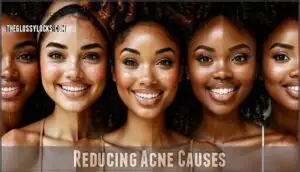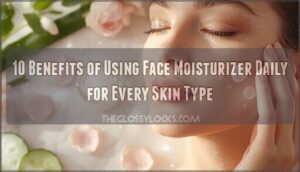This site is supported by our readers. We may earn a commission, at no cost to you, if you purchase through links.

Use non-comedogenic products to avoid clogged pores, and don’t skip moisturizer; even oily skin needs hydration. Keep your hands off your face to prevent transferring bacteria, and manage stress since it can trigger breakouts.
Eating a balanced diet and getting enough sleep also help regulate hormones that impact your skin. Remember, patience is key—clear skin doesn’t happen overnight, but small, steady changes can lead to long-term results you’ll appreciate.
Table Of Contents
- Key Takeaways
- Preventing Acne Blemishes
- Prevent Future Acne
- Reducing Acne Causes
- Daily Skincare Routine
- Healthy Lifestyle Choices
- Maintaining Clear Skin
- Frequently Asked Questions (FAQs)
- How do I stop future breakouts?
- How do you make acne blemishes go away?
- How do you prevent future acne scars?
- What reduces acne blemishes?
- Can certain medications trigger acne breakouts?
- Does smoking actually make acne worse?
- How often should I change pillowcases?
- Should I avoid dairy products for clearer skin?
- Can wearing masks cause acne flare-ups?
- Conclusion
Key Takeaways
- Stick to a consistent daily routine – Wash your face twice daily with a gentle cleanser, use non-comedogenic products that won’t clog pores, and don’t skip moisturizer even if you have oily skin.
- Keep your hands off your face – Avoid touching, picking, or popping blemishes as this transfers bacteria, worsens inflammation, and can lead to scarring and more breakouts.
- Make smart lifestyle choices – Eat a balanced diet low in sugar and dairy, exercise regularly while showering immediately after, and manage stress through relaxation techniques since cortisol triggers oil production.
- Be patient and consistent – Clear skin doesn’t happen overnight, so focus on preventing breakouts rather than quick fixes, and remember that small daily changes lead to long-term results you’ll appreciate.
Preventing Acne Blemishes
You can prevent most acne blemishes by establishing a consistent daily skincare routine that includes gentle cleansing and the right products for your skin type.
The key steps involve washing your face twice daily with a mild cleanser, avoiding harsh irritants, and using non-comedogenic moisturizers that won’t clog your pores.
Keeping Face Clean
Keeping your face clean forms the foundation of any effective acne prevention routine.
Wash twice daily with a gentle cleanser and warm water to remove excess oil, dirt, and dead skin cells.
Start each day with gentle cleansing—your skin’s first defense against breakouts begins with this simple ritual.
Always remove makeup before bed and use clean towels to pat skin dry.
Keep hair clean to prevent oil transfer, and avoid touching your face throughout the day.
To further prevent breakouts, consider using non-comedogenic skincare products to support your daily skincare routine and maintain a clean face, which is essential for effective acne prevention.
Avoiding Irritants
Skip products that can sabotage your skin’s healing process.
Alcohol-based astringents and harsh toners strip away natural oils, triggering increased oil production.
Avoid rough exfoliants that create micro-tears, worsening inflammation.
Choose noncomedogenic products instead of pore-clogging alternatives.
Stop touching your face throughout the day—your hands carry bacteria that fuel breakouts.
These irritant identification skills protect your acne prevention efforts.
Using Gentle Cleansers
Choose a mild facial cleanser with a balanced pH around 5.5 to match your skin’s natural barrier.
Look for cleanser ingredients like salicylic acid for gentle exfoliation or benzoyl peroxide for bacteria control.
Use lukewarm water temperature when washing—hot water strips protective oils.
Many people find success with a gentle skin routine.
Your washing technique matters: massage gently with fingertips, not harsh scrubbing, and stick to twice-daily cleansing frequency with noncomedogenic products.
Prevent Future Acne
Taking control of your skin’s future starts with smart preventative ingredients and consistent long-term management.
You can break the cycle of breakouts by understanding how acne prevention tips work together with proper acne home care routines.
- Apply treatments containing benzoyl peroxide or salicylic acid across your entire face, not just problem spots
- Monitor for treatment side effects and medication interactions when combining products
- Focus on acne scar prevention by avoiding picking or squeezing existing blemishes
Consistent acne and skin care prevents future damage while maintaining clear, healthy skin, which is the key to achieving clear, healthy skin through proper management.
Reducing Acne Causes
You can’t control your genetics or hormones, but you can manage the environmental factors that trigger breakouts.
Understanding what causes acne helps you make smart choices about your skincare routine, diet, and daily habits to keep your skin clear.
Hormonal Changes
Hormonal fluctuations during puberty and acne development go hand-in-hand. Your body’s androgens increase oil production, clogging pores.
Women experience pregnancy acne and menstrual cycle breakouts due to shifting estrogen and progesterone levels. PCOS impact creates persistent hormonal acne through elevated testosterone. Other endocrine conditions disrupt your hormone balance, triggering chronic breakouts.
Many adults experience rise in acne cases linked to hormonal changes.
| Life Stage | Hormonal Trigger | Acne Pattern |
|---|---|---|
| Puberty | Increased androgens | T-zone breakouts |
| Menstruation | Estrogen/progesterone shifts | Jawline cysts |
| Pregnancy | Elevated progesterone | Facial inflammation |
Genetic Factors
Your genes play a major role in acne development, with up to 85% of cases linked to genetic factors.
Family history strongly predicts your acne risk, and genetic predisposition affects inflammatory response patterns.
Key acne genetics factors include:
- Gene expression controlling sebaceous gland function
- Inherited inflammatory response patterns
- Acne heritability from parents increases susceptibility
Understanding these acne risk factors helps explain why some people struggle more with breakouts.
Environmental Influences
Your environment plays a bigger role in acne prevention than you might think.
Air quality and pollution impact your skin by clogging pores and triggering inflammation. Sun exposure can worsen breakouts despite seeming helpful.
Climate effects and seasonal acne patterns show how weather influences your skin care routine.
Making lifestyle changes to limit these acne triggers helps maintain clearer skin year-round.
Daily Skincare Routine
Your daily skincare routine forms the foundation for preventing future acne breakouts and maintaining clear skin.
Following simple, consistent steps twice daily can help remove excess oil, dirt, and dead skin cells that clog pores and lead to blemishes.
Your daily skincare routine is crucial for preventing acne, and by doing it twice daily, you can ensure that your skin remains healthy and free from acne breakouts.
Washing Face Twice Daily
Wash your face twice daily with warm water and a gentle cleanser to remove excess oil, dirt, and dead skin cells.
Use your hands instead of rough cloths to avoid irritation. Choose a mild cleanser type suited for acne-prone skin.
After facial cleansing, pat skin dry with a clean towel.
Nightly washing prevents pore-clogging buildup that triggers breakouts.
Using Non-Comedogenic Products
Beyond simply washing your face, choosing the right skincare products makes all the difference in preventing breakouts.
Non-comedogenic products won’t clog your pores, unlike traditional formulas that trap oil and bacteria.
Here’s what to prioritize when selecting acne products:
- Read ingredient labels – Avoid pore-clogging ingredients like coconut oil and cocoa butter
- Choose oil-free moisturizers – These hydrate without adding excess sebum
- Select noncomedogenic makeup – Prevents foundation from blocking pores throughout the day
To find suitable options, consider browsing a site for non-comedogenic skincare.
Avoiding Harsh Exfoliants
While exfoliation can help unclog pores, harsh scrubs damage your skin barrier and worsen acne.
Skip abrasive brushes, rough washcloths, and grainy scrubs that cause skin irritation.
Instead, choose gentle alternatives like salicylic acid or mild chemical exfoliants.
Limit exfoliation frequency to 2-3 times weekly for sensitive skin.
Check product ingredients carefully to avoid over-exfoliating and triggering more breakouts. Consistent use of a non-comedogenic moisturizer is also important.
Healthy Lifestyle Choices
Your daily habits play a significant role in preventing acne breakouts and maintaining clear skin.
Making smart choices about what you eat, how you exercise, and how you handle stress can reduce your risk of future blemishes.
Balanced Diet
Your skin’s health starts from within through balanced diet choices that target common dietary triggers.
Focus on gut health by choosing low-glycemic foods that won’t spike your sugar intake, while monitoring dairy effects on your complexion. Proper hydration levels support clear skin naturally.
- Fresh fruits and vegetables provide antioxidants that reduce inflammation and promote healing
- Whole grains and lean proteins stabilize blood sugar to prevent acne-triggering spikes
- Omega-3 rich foods like fish and nuts decrease sebum production and skin irritation
- High-fiber options support healthy eating habits while controlling hormonal fluctuations
Regular Exercise
Regular exercise offers significant acne prevention benefits by improving circulation and reducing stress hormones.
However, sweat management becomes essential during workout routines. You’ll want to shower immediately after exercising and change out of sweaty clothes quickly.
Maintain proper skin hydration throughout your fitness routine. Essential post-workout care includes gentle cleansing to remove bacteria and oil buildup from your pores, which is crucial for overall skin health.
Managing Stress
Chronic stress floods your body with cortisol and other stress hormones, creating perfect acne triggers.
When you’re overwhelmed, your skin produces excess oil and inflammation increases.
Combat this cycle through proven relaxation techniques like deep breathing and mindfulness practices.
Regular meditation, journaling, or listening to music supports emotional wellbeing.
Effective stress management directly reduces acne flare-ups and prevents emotional distress from worsening breakouts, which can be achieved through regular meditation.
Maintaining Clear Skin
Once you’ve established good daily skincare habits, maintaining clear skin requires consistent long-term practices that prevent new breakouts from forming.
You’ll need to focus on three key areas: resisting the urge to pop pimples, using oil-free moisturizers, and getting adequate sleep each night.
Maintaining clear skin introduction is about understanding the importance of these long-term practices.
Avoiding Popping Pimples
Resist the urge to pop or squeeze blemishes, as this increases infection risks and disrupts the natural healing process.
Picking pimples forces bacteria deeper into skin, triggering more inflammation and potential scarring. Your fingers carry additional germs that worsen breakouts.
Instead, apply a warm compress or use professional alternative extraction methods. Let your skin heal naturally for better inflammation control, and avoid forcing bacteria deeper into the skin to prevent more inflammation.
Using Oil-Free Moisturizers
Just because you’ve resisted the urge to pop doesn’t mean your skin care routine is complete. Your skin barrier needs proper hydration balance, even when preventing acne.
Choose oilfree moisturizer products that won’t clog pores while maintaining essential moisture levels. Many users prefer to shop for hydration online.
Here’s your hydrating skincare game plan:
- Look for noncomedogenic labels on product ingredients lists
- Apply moisturizer to damp skin using gentle upward motions
- Different skin types require specific formulations – oily skin needs lightweight gels
- Practice consistent acne prevention techniques by moisturizing twice daily for ideal acne and moisturization balance
Getting Enough Sleep
Seven to nine hours of quality sleep nightly supports your skin’s natural repair process and acne prevention.
Poor sleep disrupts your circadian rhythm, increasing stress hormones that trigger breakouts.
Establish consistent sleep hygiene by avoiding screens before bed and keeping your room cool.
Adequate sleep reduces inflammation and helps maintain healthy lifestyle habits essential for effective acne management and ideal skin health.
Sufficient rest also supports skin barrier function, which is crucial for healthy lifestyle habits and effective acne management.
Frequently Asked Questions (FAQs)
How do I stop future breakouts?
Playing whack-a-mole with pimples? You’ll wash your face twice daily with gentle cleanser, use non-comedogenic products, avoid picking spots, and maintain clean pillowcases. Consistent routine beats sporadic efforts every time.
How do you make acne blemishes go away?
Apply benzoyl peroxide or salicylic acid treatments directly to blemishes.
Use gentle cleansers twice daily, avoid picking at spots, and consider retinoids for faster healing.
Consistent treatment helps existing acne fade while preventing new breakouts, which is key to faster healing.
How do you prevent future acne scars?
Like building a fortress against future damage, you’ll prevent acne scars by avoiding picking or squeezing pimples.
Treating breakouts early with gentle products, and using sunscreen daily to protect healing skin from darkening.
What reduces acne blemishes?
You can reduce acne blemishes by using benzoyl peroxide or salicylic acid treatments.
Washing your face twice daily with gentle cleanser, and applying oil-free moisturizer, are important steps in reducing acne.
Avoiding picking at pimples to prevent scarring is also crucial in managing acne blemishes.
Can certain medications trigger acne breakouts?
Certain medications can definitely trigger acne breakouts.
Lithium, hormonal birth control, and steroids are common culprits that disrupt your skin’s natural balance.
If you’re experiencing new breakouts, review your medications with your healthcare provider to identify potential causes, such as steroids, and address them accordingly.
Does smoking actually make acne worse?
Yes, smoking definitely worsens your acne.
It reduces oxygen flow to your skin, slows healing, and increases inflammation.
Cigarettes also expose your face to toxins that clog pores and trigger more breakouts.
How often should I change pillowcases?
You should change your pillowcases weekly to prevent dirt and oil buildup that can clog pores.
If you’re dealing with active breakouts, consider switching them every three to four days for better results.
Should I avoid dairy products for clearer skin?
Does cutting dairy really help your skin glow?
Research shows mixed results on dairy’s link to acne.
You might try eliminating milk, cheese, and yogurt for 4-6 weeks to see if your skin improves noticeably.
Can wearing masks cause acne flare-ups?
Masks can trigger acne by trapping sweat, oil, and bacteria against your skin. Choose breathable cotton masks, wash them regularly, and cleanse your face gently after wearing to minimize breakouts.
Conclusion
Think of your skin like a garden that requires daily tending—neglect it for a few days, and weeds start appearing.
Learning how to prevent future acne blemishes means committing to consistent care rather than quick fixes.
Your gentle cleansing routine, non-comedogenic products, and healthy lifestyle choices work together like gardening tools.
Stay patient with the process, keep your hands off your face, and remember that preventing breakouts is always easier than treating them after they appear, which requires daily tending.












